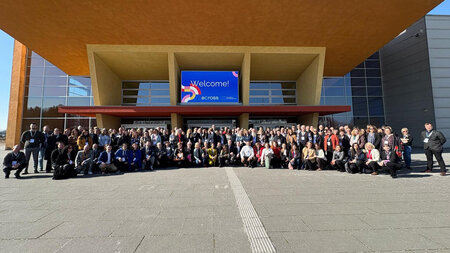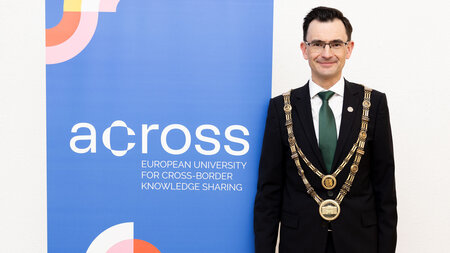"This can still reach enormous proportions"
Prof. Dr. Birgit Glorius from Chemnitz University of Technology is an expert on migration and the European asylum system - In this interview, she talks about what is probably the largest wave of refugees in Europe since World War II.
-

Prof. Dr. Birgit Glorius is the head the Professorship of Human Geography with a focus on European Migration Studies at Chemnitz University of Technology and is an expert on migration and the European asylum system. Photo/Graphic: Jacob Müller
Since the Russian invasion of Ukraine, thousands of people have been crossing the country's borders every day. Mostly women and children are fleeing misery and destruction. What does this mean for Europe? Where does the great solidarity with the refugees come from? And what is different from the refugee crisis in 2015? Frank Hommel from the Freie Presse asked Prof. Dr. Birgit Glorius, head of the Professorship of Human Geography with a focus on European Migration Studies at Chemnitz University of Technology.
Professor Glorius, in the first two weeks, the Ukraine war has already forced hundreds of thousands of people to flee. What must Europe prepare for?
It is becoming the largest wave of refugees in Europe since World War II. Now, within ten days, we are already assuming that one and a half million people have fled. The dynamics show that this can still reach enormous proportions.
What are the proportions?
Birgit Glorius: A lot depends on the further dynamics of the war. Will the fighting spread to the entire country? At the moment, it is no longer possible to flee from some of the major cities under siege. Ukraine has 40 million inhabitants, which means a significantly high number of people affected. If we look at the Donetsk and Luhansk regions in eastern Ukraine, which have already been contested since 2014, 6 million people still lived there in 2014. The UNHCR, the UN Refugee Agency, estimates that at least 1.5 million people have left these areas since 2014.
So a quarter of the population.
Exactly. Converted to the whole of Ukraine, this would amount to ten million people. This is all extremely hypothetical. But the war is very violent, it doesn't look like it's going to end quickly, and Ukraine is very populous. The result of these three factors is that, as I said, it's going to be the biggest refugee crisis that Europe has seen since World War II.
What have been the largest intra-European refugee movements to date?
We in Germany have the end of the Second World War as a reference point. Of 14 million refugees of German origin, 12 million were taken in by Germany. Later, we had as a major turning points the wars of former Yugoslavia with very high numbers of refugees who found refuge in Austria, Switzerland, and Germany. Since the countries are relatively small, this is not comparable to Ukraine with its 40 million inhabitants. In 2015, about 900,000 refugees were registered in Germany over the whole year.
Are the people from Ukraine now mainly fleeing from the armed conflicts or are they already thinking about the time after?
Both. Since 2014, people have fled eastern Ukraine both directly and long-term because there were no longer any prospects for their lives. In the Ukraine war, we are currently in a second wave. The first wave last week involved people who did not want to wait for the aggression of Russian forces to become increasingly severe. For the past few days, we have been seeing people who have fled directly from the bombardments. At first, people often stay in the first place of refuge because they cannot realize that their previous life is over. People hope that they can go back. They draw energy from this hope. It fades with time. When it is realized that it will take longer, that there is no place to go back to, people move on. We see the destruction that is being wrought at the moment. We see that there is no solution in sight. That's why we in Germany have to be prepared to take in people on a large scale.
Surely more than in 2015?
I assume so. Also because we are in the immediate neighborhood of Poland and Poland can no longer handle this amount of people. Since people can travel visa-free in Europe, it is logical that they travel further.
Compared to 2015, there is a relatively high level of solidarity among the population and politicians.
That's true, and it's very different from 2015. You can determine that from a few points. One is this feeling of being directly affected. A second point: It may sound cynical, but you can't stop the refugee movement with a political decision like the EU-Turkey agreement. The third is the political framework. Unanimously, the EU states have suspended the asylum mechanisms, which are very lengthy and eat up a lot of administrative resources. The same applies to the Dublin Regulation, which governs which country is responsible for reception and asylum procedures. That was the big political issue in 2015. Now it's different. People can find accommodation anywhere in Europe. They have temporary protection status, initially for three years. This gives them immediate access to social benefits, the labor market, the health and education system, and so on. That is already a very serious difference.
Is this consensus surprising?
Yes and no. The big blockade in 2015/2016 against the solidary distribution of refugees came from the so-called Visegrád countries: Poland, Czech Republic, Slovakia, Hungary. This was partly a protest against the dominance of the old EU states. And it was characterized by the fact that the migrants of that time were perceived as very, very foreign. There were also racist motives: that one could not imagine taking in Muslim people and treated people of other skin colors with great suspicion. And they had the feeling that we were not at all responsible for them. That is different now. They are direct neighbors. They share the post-Soviet fate. Images and emotions also played a role. Ukrainian President Volodymyr Zelenskyy made his mark in the way he pleaded with the EU states and appealed for solidarity.
Can the mood in the population and politics change again?
That is always possible. That prejudices arise against the alleged inaction of refugees, that social envy arises. We also know anti-Slavic racism. Countries could also say: We can't take any more. At the moment, however, it is pointless to think about this, because this conflict is still burning so hot. We don’t know how it will develop.
Why is it now possible to do what was so difficult in 2015?
A valid question. It would have been easier for the people who came in 2015/2016 to stabilize and start an independent life if they had enjoyed precisely these regulations. If they did not have to go through the asylum procedure. Many were kept in uncertainty for a very long time, the procedures dragged on because of a lack of capacity or complicated cases. During that time, people were excluded from many areas of social participation. But at that time, Europe was a downstream region that took people from conflict regions and responded in part with ideas of isolation. Now the conflict is in the middle of Europe. There is no escaping responsibility.
To ask Angela Merkel: Can we do it?
I would like to respond with a famous Merkel phrase. There is no alternative. People are coming. They probably won't be able to go back, even in the medium term. It will take enormous efforts that require a new way of thinking. After World War II, displaced persons made up more than half the population in some regions. In Bavaria, entire cities have been rebuilt. Thinking far into the future, I can imagine something like that now. That perhaps Ukrainian exile schools will be set up there, that settlements will be built. In Poland, this kind of thinking is likely to begin soon.
For further information, please contact Prof. Dr. Birgit Glorius, phone 0371 531-33435, e-mail birgit.glorius@phil.tu-chemnitz.de.
About the person: Prof. Dr. Birgit Glorius
After studying geography at Julius-Maximilians-Universität Würzburg, Birgit Glorius moved to the University of Texas (Austin) to study abroad. In 2007, she completed her doctorate on "Polish Migrants in Leipzig - A Transnational Perspective on Migrants and Integration" at Martin-Luther-Universität Halle-Wittenberg. This was followed by positions as a research assistant in Halle and Leipzig, before she moved to Chemnitz University of Technology in 2013 to take up the Junior Professorship of Human Geography of Central and Eastern Europe. Since October 2018, she has headed the Professorship of Human Geography with a focus on European Migration Studies at the Faculty of Humanities at Chemnitz University of Technology. In 2021, she took over the leadership of the scientific advisory board of the Federal Office for Migration and Refugees; she has been a member of this advisory board since 2019.
Glorius' research focuses on migration research and demographic change. She also works on social geographic topics and questions of regional development. In recent years, she has been particularly interested in the Saxon-Czech border region, Bulgaria and the Western Balkan states. Glorius led, among others, the research project "Evaluation of the Common European Asylum System under Pressure and Recommendations for Further Development" (CEASEVAL), funded by HORIZON 2020. Currently, the migration researcher is primarily involved in projects on European asylum policy and the integration of refugees in rural areas of Germany.
Note: Under the heading "Hintergrund" (Background), the Freie Presse published this interview with Prof. Dr. Birgit Glorius in the issue of March 9, 2022. Under this heading or under the theme "Einspruch - Standpunkte zum Streiten" (Objection - Points of View to Argue), controversial opinions from science and society are to continue to be made more public and to stimulate discussion. Members of Chemnitz University of Technology who would like to express themselves here in well-founded manner are invited to do so.
Contact: chefredaktion@freiepresse.de and/or mario.steinebach@verwaltung.tu-chemnitz.de.
(Translation: Brent Benofsky)
Matthias Fejes
11.03.2022





